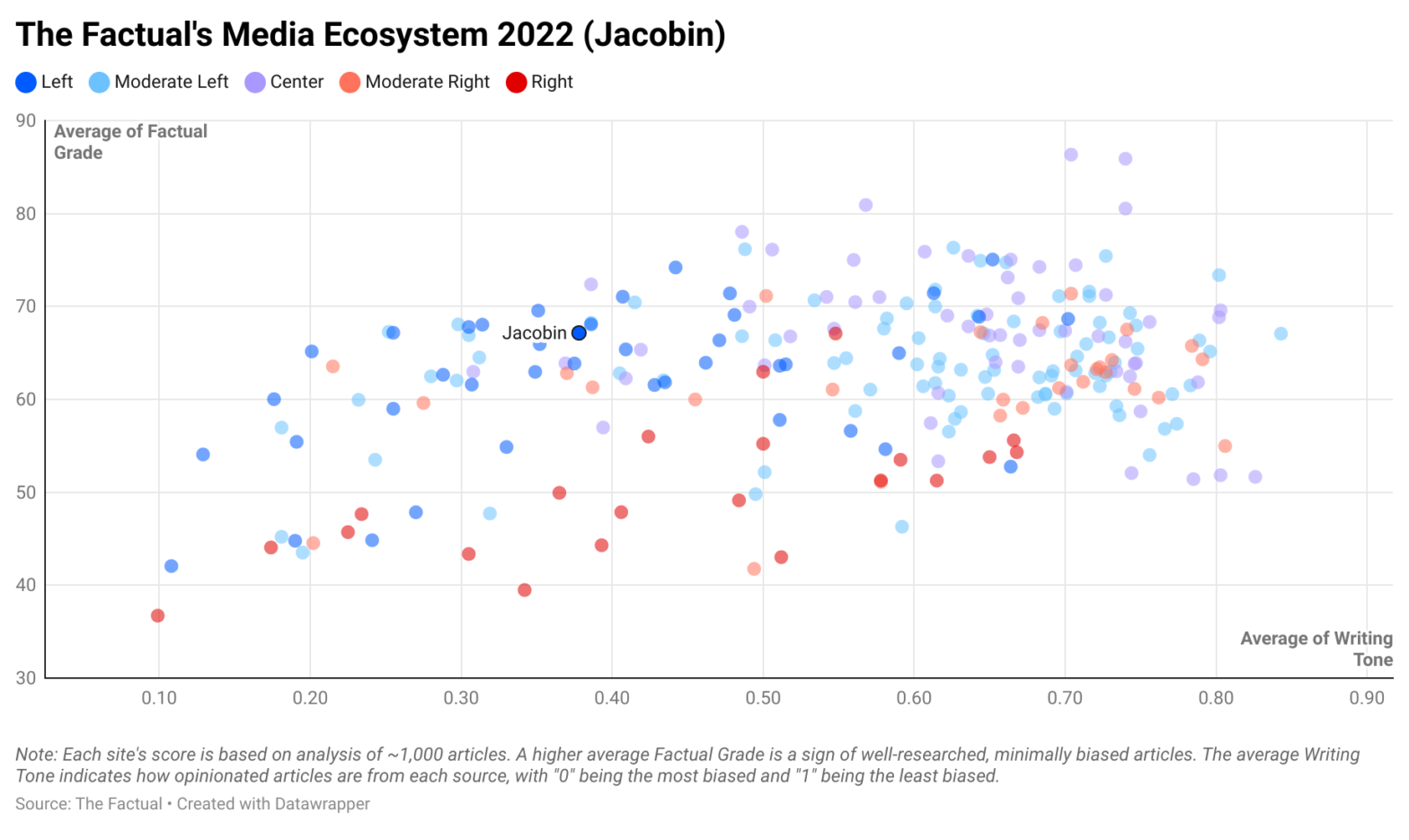Jacobin is an American socialist magazine based in New York. It describes itself as a publication for the new generation of Marxist — a magazine for those who have perhaps not lived through the Cold War yet who nonetheless wish to explore socialist perspectives on politics, business, and culture. Accolades have been given to the magazine, with thinkers like Noam Chomsky cherishing the publication’s “penetrating, lively discussions and analyses of matters of real significance, from a thoughtful left perspective.” Yet, the magazine’s explicit radicalism puts its objectivity and credibility in question. So, how biased is Jacobin?
How Does The Factual Rate News Sources?
The Factual analyzes more than 10,000 news stories every day to help readers find the most informative, least-biased articles. Our news-rating algorithm scores each article along four metrics: (1) cited sources and quotes, (2) publication history, (3) writing tone, and (4) author expertise. These scores combine in a weighted average we call a Factual Grade, which ranges from 0–100%. (See our How It Works page to learn more about our algorithm.)
For this study, we analyzed ~1,000 articles each from 240 news sources. The average Factual Grade for the entire dataset was 62.5%. Based on these averages, we can compare the performance of news sites across the media ecosystem. The entire dataset can be explored in greater detail here.
How Factual Is Jacobin?
Jacobin scored an average Factual Grade of 67.2%, placing it in the 69th percentile of our dataset. These scores suggest that the site routinely publishes articles with high-quality sourcing of information from a team of topically experienced writers. However, its articles contain emotionally loaded wording and headlines. Articles typically criticize political or corporate figures while lionizing democratic socialist proponents and organizations. The magazine also almost exclusively responds to Marxist concerns such as class disparity and the empowerment of the proletariat, steering its coverage toward stories that follow progress in these areas. The magazine admonishes both Republicans as well as corporately-aligned Democrats alike in its criticisms.
Like any news source, scores for articles from Jacobin varied widely based on factors like author expertise and cited evidence. For example, some scored above 80%, while others scored below 50%.
Please check your email for instructions to ensure that the newsletter arrives in your inbox tomorrow.
How Opinionated Is Jacobin?
One of the metrics The Factual uses is the Writing Tone, which measures how opinionated the writing is in an article. For this metric, the algorithm looks for signs of subjective commentary (e.g., first person pronouns and unnecessary adverbs), as well as the emotional nature of selected words, and sees how prevalent they are for a given length of text. More neutral text receives higher ratings, with “0” being the most opinionated and “1” being the most neutral.
Jacobin had an average Writing Tone score of 0.38, placing it in the 18th percentile in our dataset for this metric. This suggests that articles from Jacobin often incorporate highly opinionated writing. As mentioned above, this low score likely comes from its highly polemic nature, including articles with biased headlines such as “Wall Street Is Fleecing a Bunch of Teachers” and “Meet Joe Manchin’s Appalling Daughter.”
What Is Jacobin’s Political Bias?
The Factual classifies news sites by political bias as either Left, Moderate Left, Center, Moderate Right, or Right. This classification comes from third-party assessments from media bias organizations such as AllSides and Media Bias/Fact Check (MBFC). Based on this data, The Factual assigns Jacobin a “Left” bias.
MBFC classifies Jacobin’s as “Left.” This is due to the publication’s inherently socialist lens, which influences its story selection and causes the site to employ emotionally biased headlines and wording. MBFC mentions that Jacobin’s criticisms are not only directed toward Republicans but the liberal wing of the Democratic party as well. The magazine scores “High” in MBFC’s reliability metrics, owing to its completely clean fact-check record since its foundation in 2011.
It appears that AllSides has yet to complete a typical in-depth review of Jacobin. However, due to the magazine’s self-classification as leftist, AllSides uncontroversially assigns it a “Left” classification.
Please check your email for instructions to ensure that the newsletter arrives in your inbox tomorrow.
Who Owns Jacobin?
Jacobin is founded, published, and edited by Bhaskar Sunkara, who started working on the magazine in 2010 during a hiatus from his studies at George Washington University—a period in which he became enthralled by Marx and similar thinkers. The magazine began to gain traction during the rising interest in democratic socialism associated with Bernie Sanders’ 2016 presidential campaign. Jacobin now boasts a paid print circulation of 75,000 subscribers, and reaches a monthly online readership of 3 million. The magazine has had a tremendous influence on the momentum of progressive thought within the past 5 years, reintroducing socialism to a broader audience in an accessible way.
Bhaskar Sunkara also publishes Catalyst: A Journal of Theory and Strategy and London's Tribune. Apart from commitments to these magazines, Sunkara has served as vice chair of the Democratic Socialist Alliance, is a featured columnist for The Guardian, and regularly contributes to Vice magazine as well as the New York Times, Washington Post, and The Nation.
Why Does It Matter?
News articles always have some bias because all authors have some frame of reference within which they describe a story. Political bias ratings are helpful in understanding this framing. However, it can be more beneficial to know how factual an article is based on quantifiable metrics that can be seen across the media ecosystem, such as cited evidence, author expertise, and writing tone. This is what The Factual ascertains.
Reading several, highly rated articles from across the political spectrum helps counter the bias of any news source or story. To have the day’s most factual news stories delivered to your inbox every morning, subscribe to our daily newsletter.
Article updated on September 19, 2022 to reflect new data.

